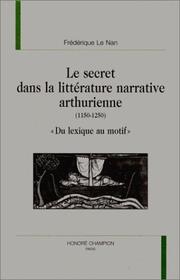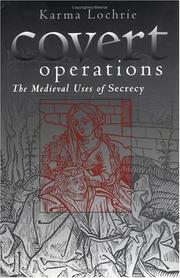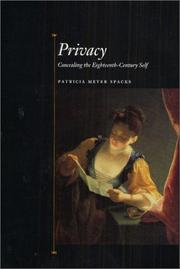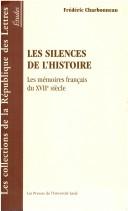| Listing 1 - 9 of 9 |
Sort by
|
Book
ISBN: 9789042930988 9042930985 9782758402121 2758402122 Year: 2014 Publisher: Leuven : Peeters
Abstract | Keywords | Export | Availability | Bookmark
 Loading...
Loading...Choose an application
- Reference Manager
- EndNote
- RefWorks (Direct export to RefWorks)
Alors que notre époque semble ne laisser aucune place au secret, il est difficile d'imaginer quelle fut son importance dans la pensée et la pratique sous l'Ancien Régime. Le présent volume, issu d'un colloque international qui s'est tenu à Reims, examine ce que fut le secret durant les XVIIe et XVIIIe siècles, tout en ouvrant l'étude à des textes originels comme le Roman du Graal, à la période romantique avec Senancour, Chateaubriand et Stendhal, voire au XXe siècle. Les contributions déclinent les diverses formes du secret : discrétion, dissimulation, énigme, mystère, implicite, clandestinité, espionnage. Dans la première partie, elles touchent à l'anthropologie et au rapport qu'entretiennent le politique et la morale. Une esthétique du secret s'affirme quand les poètes, les peintres et les dramaturges sollicitent la participation du spectateur. Le « plaisir secret » se charge alors de valeur positive. Les auteurs, les libraires et les journalistes n'ignorent pas la valeur pragmatique du secret. La seconde partie du volume porte sur les fictions. Le roman de cette époque élabore des dispositifs ingénieux pour exprimer ce qui est à la fois montré et caché. Il circonscrit le secret dans son ambiguïté, sans pouvoir le dire vraiment. Quel que soit son intérêt au Grand Siècle, le secret d'amour tend à se vider de son contenu pour mieux éclairer les processus de communication. Le roman du siècle suivant hésite entre la dissimulation et la transparence ; avec le conte, il use de l'énigme et de la mystification pour mener un combat idéologique et pour interroger l'inconscient jusque dans l'érotisme et l'inceste. Ainsi la poétique du secret qui se développe jusqu'au seuil du XIXe siècle permet de repenser plus largement le rapport du lecteur à la production littéraire.
Secrecy in literature --- Secret dans la littérature --- Secret dans la littérature --- Fiction --- Thematology --- French literature --- History and criticism --- Ethics --- Morale --- Littérature française --- History. --- Themes, motives --- Histoire --- Thèmes, motifs --- Congresses --- Themes, motives.
Book
ISBN: 0820309923 Year: 1988 Publisher: Athens London University of Georgia Press
Abstract | Keywords | Export | Availability | Bookmark
 Loading...
Loading...Choose an application
- Reference Manager
- EndNote
- RefWorks (Direct export to RefWorks)
Fiction --- American literature --- Hawthorne, Nathaniel --- Geheim in de literatuur --- Hawthorne, Nathaniel, 1804-1864. The House of the Seven Gables --- Secrecy in literature --- Secret dans la littérature --- Sympathie dans la littérature --- Sympathie in de literatuur --- Sympathy in literature --- Criticism and interpretation --- James, Henry

ISSN: 07690940 ISBN: 2745306111 9782745306111 Year: 2002 Volume: 62 Publisher: Paris : Editions Honoré Champion,
Abstract | Keywords | Export | Availability | Bookmark
 Loading...
Loading...Choose an application
- Reference Manager
- EndNote
- RefWorks (Direct export to RefWorks)
Fiction --- Old French literature --- Arthur [King] --- anno 1100-1199 --- anno 1200-1299 --- Geheim in de literatuur --- Secrecy in literature --- Secret dans la littérature --- French literature --- Arthurian romances --- History and criticism. --- History and criticism --- French poetry --- To 1500 --- King Arthur [Fictitious character] --- French literature - To 1500 - History and criticism. --- Arthurian romances - History and criticism.
Book
ISBN: 9782705687311 Year: 2014 Volume: *36 Publisher: Paris : Hermann,
Abstract | Keywords | Export | Availability | Bookmark
 Loading...
Loading...Choose an application
- Reference Manager
- EndNote
- RefWorks (Direct export to RefWorks)
Tueur en série, assassin de femmes vulnérables qu’il met à l’épreuve de la curiosité avant de les en punir, Barbe-Bleue est une figure de la violence conjugale que l’on retrouve, depuis Charles Perrault, sous diverses variantes au théâtre, au cinéma, dans la peinture occidentale comme en poésie et encore très récemment dans un roman d’Amélie Nothomb. Ce qui fascine, outre la brutalité des faits, c’est qu’une part de secret résiste à la compréhension : le « pourquoi » des meurtres et des pièges nous reste opaque. Serait-ce que Barbe-Bleue est en fait la victime, de la rumeur, de médisances, mais surtout de l’indiscrétion de femmes volages, incapables de lui laisser une part d’intimité ? Penser le secret de Barbe-Bleue, c’est interroger l’intimité, la confiance et l’interdit dans le couple occidental moderne.
Bluebeard (Legendary character) in literature --- Secrecy in literature --- Barbe-Bleue (Personnage légendaire) dans la littérature --- Secret dans la littérature --- Perrault, Charles, --- Criticism and interpretation --- Barbe-Bleue (conte) --- Secret --- Dans la littérature --- Barbe-Bleue (Personnage légendaire) dans la littérature --- Secret dans la littérature --- Criticism and interpretation. --- Bluebeard --- Dans la littérature.
Book
ISSN: 16214129 ISBN: 2840504065 9782840504061 Year: 2005 Volume: 22 Publisher: Paris Presses de l'université Paris-Sorbonne
Abstract | Keywords | Export | Availability | Bookmark
 Loading...
Loading...Choose an application
- Reference Manager
- EndNote
- RefWorks (Direct export to RefWorks)
Historiography --- Secrecy in literature --- Autobiography --- Diaries --- Letters --- Historiographie --- Secret dans la littérature --- Autobiographie --- Journaux intimes --- Lettres (Genre littéraire) --- History and criticism. --- Histoire et critique --- Europe --- Biography. --- Biographie --- European diaries --- European letters --- Privacy --- History and criticism --- History --- Secret dans la littérature --- Lettres (Genre littéraire) --- European diaries - History and criticism --- European letters - History and criticism --- Privacy - Europe - History --- Europe - Biography

ISBN: 0812234731 Year: 1999 Volume: *40 Publisher: Philadelphia : University of Pennsylvania Press,
Abstract | Keywords | Export | Availability | Bookmark
 Loading...
Loading...Choose an application
- Reference Manager
- EndNote
- RefWorks (Direct export to RefWorks)
Droit médiéval dans la littérature --- Geheim in de literatuur --- Gossip in literature --- Huwelijk in de literatuur --- Huwelijk--Ritussen en gewoonten [Middeleeuwe] --- Kwaadsprekers in de literatuur --- Law [Medieval ] in literature --- Mariage dans la littérature --- Mariage--Rites et coutumes médiévales --- Marriage customs and rites [Medieval ] --- Marriage in literature --- Mauvaise langue dans la littérature --- Middeleeuwse wetenschappen in de literatuur --- Recht [Middeleeuws ] in de literatuur --- Science [Medieval ] in literature --- Science médiévale dans la littérature --- Secrecy in literature --- Secret dans la littérature --- Sodomie dans la littérature --- Sodomie in de literatuur --- Sodomy in literature --- Wetenschappen [Middeleeuwse ] in de literatuur --- Littérature anglaise --- Femmes --- Secret --- Mariage --- Commérage --- Thèmes, motifs --- Dans la littérature --- Angleterre (GB) --- Conditions sociales --- English literature --- Middle English, 1100-1500 --- History and criticism --- Women and literature --- England --- History --- To 1500 --- Women --- Middle Ages, 500-1500 --- Social conditions --- 1066-1485 --- Thèmes, motifs. --- Dans la littérature.

ISBN: 0226768600 9786613150837 0226768619 1283150832 9780226768618 9781283150835 6613150835 9780226768601 Year: 2003 Publisher: Chicago University of Chicago Press
Abstract | Keywords | Export | Availability | Bookmark
 Loading...
Loading...Choose an application
- Reference Manager
- EndNote
- RefWorks (Direct export to RefWorks)
Today we consider privacy a right to be protected. But in eighteenth-century England, privacy was seen as a problem, even a threat. Women reading alone and people hiding their true thoughts from one another in conversation generated fears of uncontrollable fantasies and profound anxieties about insincerity. In Privacy, Patricia Meyer Spacks explores eighteenth-century concerns about privacy and the strategies people developed to avoid public scrutiny and social pressure. She examines, for instance, the way people hid behind common rules of etiquette to mask their innermost feelings and how, in fact, people were taught to employ such devices. She considers the erotic overtones that privacy aroused in its suppression of deeper desires. And perhaps most important, she explores the idea of privacy as a societal threat-one that bred pretense and hypocrisy in its practitioners. Through inspired readings of novels by Defoe, Richardson, Fielding, and Sterne, along with a penetrating glimpse into diaries, autobiographies, poems, and works of pornography written during the period, Spacks ultimately shows how writers charted the imaginative possibilities of privacy and its social repercussions. Finely nuanced and elegantly conceived, Spacks's new work will fascinate anyone who has relished concealment or mourned its recent demise.
Geheim in de literatuur --- Ik in de literatuur --- Moi dans la littérature --- Privacy in de literatuur --- Privacy in literature --- Secrecy in literature --- Secret dans la littérature --- Self in literature --- Vie privée dans la littérature --- English fiction --- Privacy in literature. --- Secrecy in literature. --- Self in literature. --- History and criticism. --- English fiction -- 18th century -- History and criticism. --- English fiction - 18th century - History and criticism. --- English --- Languages & Literatures --- English Literature --- History and criticism --- Soi dans la littérature --- Zelf in de literatuur --- 18th century --- 18th century, 1900s, history, historical, time period, english, humanities, college, university, higher ed, academic, scholarly, research, privacy, rights, england, united kingdom, uk, fear, anxiety, emotions, insincerity, sincerity, public, social studies, society, pressure, hypocrisy, erotic, desire, novels, close reading, analysis, defoe, richardson, fielding, sterne, diary, autobiography, poetry, pornography, sex, propriety.
Book
ISBN: 0691069514 1306985455 0691604703 1400863031 9781306985451 9781400863037 9780691069517 Year: 2014 Publisher: Princeton, NJ
Abstract | Keywords | Export | Availability | Bookmark
 Loading...
Loading...Choose an application
- Reference Manager
- EndNote
- RefWorks (Direct export to RefWorks)
Family Secrets and the Psychoanalysis of Narrative is the first book to explore the implications of the psychoanalytic theory of the phantom for the study of narrative literature. A phantom is formed when a shameful, unspeakable secret is unwittingly transmitted, through cryptic language and behavior, transgenerationally from one family member to another. The "haunted" individual to whom the "encrypted" secret is communicated becomes the unwitting medium for someone else's voice--and the result is speech and conduct that appear incongruous or obsessive in a variety of ways. Through close readings of texts by Conrad, Villiers de l'Isle-Adam, Balzac, James, and Poe, Esther Rashkin reveals how shameful secrets, concealed within the unspoken family histories of fictive characters, can be reconstructed from their linguistic traces and can be shown not only to drive the characters' speech and behavior but also to generate their narratives. First articulated by the French psychoanalysts Nicolas Abraham and Maria Torok, the theory of the phantom here represents a radical departure from Freudian, Lacanian, and other psychoanalytic approaches to literary interpretation. In Rashkin's hands, it also provides a response to structuralist and poststructuralist critiques of character analysis, an alternative to deconstructive strategies of reading, and a new vantage point from which to consider problems of intertextuality, "authorship," and the formation and origins of narrative.Originally published in 1992.The Princeton Legacy Library uses the latest print-on-demand technology to again make available previously out-of-print books from the distinguished backlist of Princeton University Press. These editions preserve the original texts of these important books while presenting them in durable paperback and hardcover editions. The goal of the Princeton Legacy Library is to vastly increase access to the rich scholarly heritage found in the thousands of books published by Princeton University Press since its founding in 1905.
Famille dans la littérature --- Family in literature --- Geheim in de literatuur --- Gezin in de literatuur --- Literature and psychoanalysis --- Literatuur en psychoanalyse --- Littérature et psychanalyse --- Narration (Rhetoric) --- Narration (Rhétorique) --- Narrative writing --- Psychanalyse et littérature --- Psychoanalyse en literatuur --- Psychoanalysis and literature --- Secrecy in literature --- Secret dans la littérature --- Verhaal (Retoriek) --- Short stories, American --- Short stories, English --- Short stories, French --- Secrecy in literature. --- Family in literature. --- History and criticism --- Theory, etc. --- Families in literature. --- 820-32 --- -Short stories, English --- -Short stories, French --- -French short stories --- French fiction --- English short stories --- English fiction --- American short stories --- American fiction --- Psychoanalytic literary criticism --- Literature --- Narrative (Rhetoric) --- Rhetoric --- Discourse analysis, Narrative --- Narratees (Rhetoric) --- Engelse literatuur: kort verhaal; novelle --- -Theory, etc --- -Engelse literatuur: kort verhaal; novelle --- 820-32 Engelse literatuur: kort verhaal; novelle --- -Literature and psychoanalysis --- French short stories --- Families in literature --- History and criticism&delete& --- Theory, etc --- Short stories [American ] --- Short stories [English ] --- Short stories [French ] --- Short stories, American - History and criticism - Theory, etc. --- Short stories, English - History and criticism - Theory, etc. --- Short stories, French - History and criticism - Theory, etc. --- Psychoanalysis and literature. --- Psychoanalysis and literature - English-speaking countries. --- Psychoanalysis and literature - France.

ISBN: 2763778259 9782763778259 Year: 2002 Publisher: Ste-Foy, P.Q. : Les Presses de l'Université Laval,
Abstract | Keywords | Export | Availability | Bookmark
 Loading...
Loading...Choose an application
- Reference Manager
- EndNote
- RefWorks (Direct export to RefWorks)
On peut dire que le principal propos des Mémoires d'Ancien Régime consiste à dénoncer les Silences de l'Histoire, à en dévoiler les détails scabreux, les revers obscurs, les rouages que dissimulent le pouvoir et ses chantres. Le mémorialiste veut par là se défendre contre l'oubli ou contre l'infamie dont le menacent les versions de l'Histoire qui ont publiquement cours. Le secret, ou sa révélation, est ainsi la raison de l'écriture, son primum mobile ; il parcourt comme un fil de trame ces oeuvres indiscrètes par excellence, depuis les retraites où elles s'écrivent jusqu'aux circuits clandestins de leur diffusion, du témoignage brutal des grands seigneurs aux délations cursives des courtisans. Mais le secret est aussi motif, thème obsédant : constamment différé, il irrite la curiosité du lecteur, se faisant stratégie d'écriture, artifice rhétorique et forme vide. Enfin, il est un secret de troisième niveau, ineffable, infiniment antérieur à toute motivation tactique, interrogation fondamentale du mémorialiste sur sa propre histoire en ce qu'elle lui résiste, noyau incompréhensible et dur. L'intrigue et le présage en sont les deux formes écrites : principes organisateurs de la vie et du texte, ils instruisent le déchiffrement des mystères profanes ou sacrés qui ordonnent le déroulement de l'Histoire et permettent au mémorialiste, comme au lecteur moderne, d'en approcher le sens caché.
French diaries --- Journaux intimes français --- Prose française --- Littérature et histoire --- Journaux intimes français --- Littérature et histoire --- French literature --- anno 1600-1699 --- French prose literature --- Literature and history --- Prose française --- History and criticism. --- History --- Histoire et critique. --- Histoire --- France --- History and literature --- History and poetry --- Poetry and history --- History and criticism --- Pʻŭrangsŭ --- Frankrig --- Francja --- Frant︠s︡ii︠a︡ --- Prantsusmaa --- Francia (Republic) --- Tsarfat --- Tsorfat --- Franḳraykh --- Frankreich --- Fa-kuo --- Faguo --- Франция --- French Republic --- République française --- Peurancih --- Frankryk --- Franse Republiek --- Francland --- Frencisc Cynewīse --- فرنسا --- Faransā --- Franza --- Republica Franzesa --- Gallia (Republic) --- Hyãsia --- Phransiya --- Fransa --- Fransa Respublikası --- Franse --- Францыя --- Frantsyi︠a︡ --- Французская Рэспубліка --- Frantsuzskai︠a︡ Rėspublika --- Parancis --- Pransya --- Franis --- Francuska --- Republika Francuska --- Bro-C'hall --- Френска република --- Frenska republika --- França --- República Francesa --- Pransiya --- Republikang Pranses --- Γαλλία --- Gallia --- Γαλλική Δημοκρατία --- Gallikē Dēmokratia --- فرانسه --- Farānsah --- צרפת --- רפובליקה הצרפתית --- Republiḳah ha-Tsarfatit --- פראנקרייך --- 法国 --- 法蘭西共和國 --- Falanxi Gongheguo --- フランス --- Furansu --- フランス共和国 --- Furansu Kyōwakoku --- Francija --- Ranska --- Frankrike --- France (Provisional government, 1944-1946) --- Histoire et critique --- Sources --- Historiography --- Historiographie --- Sources. --- Historiography. --- Fa-lan-hsi --- Falanxi --- Frankrijk --- Frant︠s︡ --- Frant︠s︡ Uls --- Франц --- Франц Улс --- 法蘭西 --- 프랑스 --- French diaries - History and criticism --- French prose literature - 17th century - History and criticism --- Literature and history - France - History - 17th century --- France - History - 17th century - Sources --- Journaux intimes francais --- Secret dans la litterature --- 17e siecle
| Listing 1 - 9 of 9 |
Sort by
|

 Search
Search Feedback
Feedback About UniCat
About UniCat  Help
Help News
News